What are the Rules for Global Giveaways in 2026?
Giveaways are among the best ways to promote your brand or business wherever you live, but are they legal?
Most countries have similar regulations regarding the measures that must be taken to keep your giveaway within the law. However, each country has varying requirements.
Choosing the proper promotion for your business is one thing – ensuring you’re not breaking the law while running it is another. For this reason, it can be daunting to run your first giveaway, so cue our giveaway guide to help!
This guide will help you understand your home country’s rules so you can run your giveaway above board. First, look at a Giveaway Terms And Conditions Template we have prepared for you. You can use this as a reference and replace the variables (mentioned within the “[” and “]” with your relevant data.
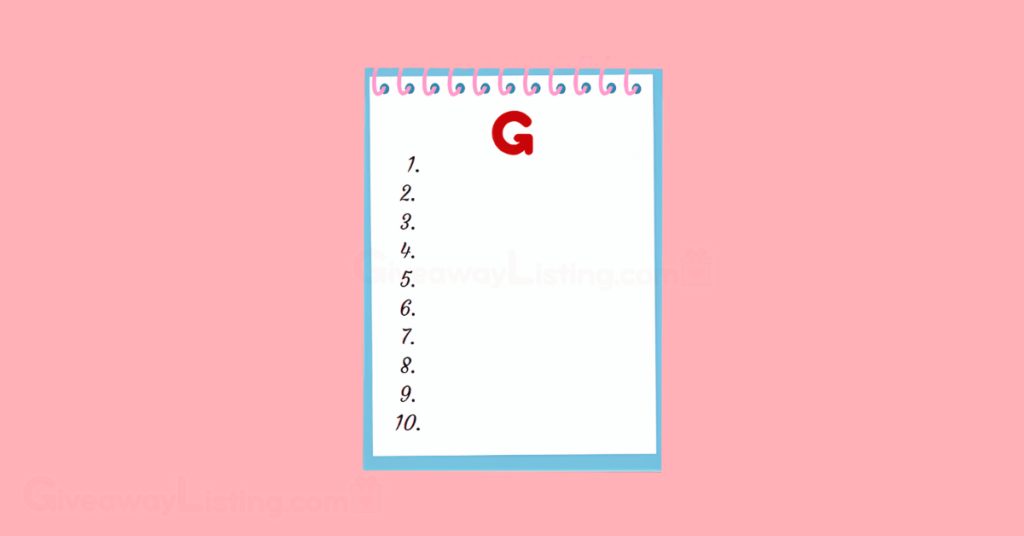
Giveaway Terms and Conditions Template
Terms and Conditions for [Organiser Name]’s [Social Media Platform] Giveaway Contest as of [Date]
- Eligibility: The giveaway contest is open to participants who meet the following criteria:
- Reside in [Country/Region]
- Are [Age] years of age or older
- Are not employees of [Organiser Name] or their affiliates, nor members of their immediate families or households.
- Entry: To enter, participants must follow the instructions outlined in the contest post on [Social Media Platform]. Entry requirements may include liking, sharing, following, or tagging friends. Entries complete, accurate, or submitted after the deadline will be disqualified.
- Duration: The giveaway contest starts on [Start Date] and ends on [End Date] at [Time] [Time Zone]. Only entries submitted before the deadline will be considered.
- Prize: The winner will receive [Prize Description]. As defined in the terms, the prize is non-transferable, and there will be no cash alternatives to it. [Organiser Name] reserves the right to substitute the prize with a product or service of equal value.
- Winner Selection: The winner will be selected randomly from all eligible entries by the deadline. The winner will be notified by [Social Media Platform] direct message within [Number of Days] days after the deadline. If the winner does not respond within [Number of Days], another winner will be selected.
- Publicity: By participating in the giveaway contest, the winner agrees to allow [Organiser Name] to use their name, photograph, and likeness for promotional and advertising purposes without compensation.
- Liability: [Organiser Name] is not responsible for any injury, loss, or damage to participants or their property related to their participation in the giveaway contest. Participants agree to release and hold harmless [Organiser Name] and their affiliates from any liability, injury, loss, or damage resulting from participation in the giveaway contest or acceptance, use, or misuse of the prize.
- Governing Law: The giveaway contest and these terms and conditions are governed by and construed per the laws of [Country/Region].
- Dispute Resolution: Any dispute arising from or related to the giveaway contest or these terms and conditions will be resolved through binding arbitration per the rules of [Arbitration Service]. The arbitration will occur in [City], [Country/Region], and the arbitrator’s decision will be final and binding.
- Modification: [Organiser Name] reserves the right to modify, suspend, or terminate the giveaway contest without notice. [Organiser Name] also reserves the right to modify these terms and conditions without notice.
This giveaway terms template has been provided for free by GiveawayListing.com as a reference point but does not constitute a legal claim by anyone beyond the [Organiser Name]
By participating in the giveaway contest, participants agree to be governed by these terms and conditions, as defined by the [Organiser Name].
Last update: 07-01-2026

Worldwide Giveaways
All worldwide giveaways are divided into four categories: sweepstakes, Raffles, Rewards, and Contests. We will explain each type in detail later.
Sweepstakes or giveaways’ main features:
- Based on luck
- Free promotion
- Randomly selected winner
- Additional (free) entries are sometimes available
Raffle or lottery main features:
- Based on luck
- Paid promotion (ticketed in some way)
- Randomly selected winner
- Multiple (paid) entries are sometimes available
Rewards main traits:
- Based on merit
- Free or paid promotion
- Entrants must meet the requirements to win
- Typically, more than one winner
Contests’ main traits:
- Based on merit
- Free promotion
- Winners are selected based on skill
- Competition/talent-based (usually one winner)
Note: Free giveaway promotions are the easiest to manage. There are legal restrictions on paid promotions, such as raffles or lotteries, as they are considered gambling.
Tip: You will usually need a license to run a paid giveaway. However, some loopholes ensure this does not apply to you.
You can also choose to run a free giveaway. Free giveaways work just as well as paid ones (or possibly even better) for your business.

9 Ways to Run a Legal Contest in 2026
Wherever you may be, here are 9 ways to run a viral contest utilizing universal giveaway terms and conditions.
1. Be Transparent
Generally, you need to be transparent as a giveaway organizer. If anyone requests the giveaway details or the list of winners from your giveaway, you need to have them on hand.
Some countries require you to send your list of giveaway winners to local authorities, which is one reason you need to know local laws (more on that later)!
In addition, you are not allowed to ask participants to visit a third-party site as an entry requirement for the giveaway. If you ask participants to visit third-party sites, you may have to prove your reason, which could get you in trouble.
2. Check Local Laws
You should check local laws and guidelines for where you are holding giveaways. Also, ensure you know if other countries can enter your giveaways before offering prizes to entrants in that country!
For instance, some US states prohibit purchase requirements (such as entry fees) when winners are chosen based on merit or skill.
3. Detail Official Rules
You must disclose all information about your contest in the official rules wherever you are. You should include how the winner/s will be selected, how many winners will be, and so on. Make sure you detail anything specific to your giveaway rules.
This step is essential to prove your contest is trustworthy and legal. If anyone requests your giveaway information, you must have it readily available. You don’t have to write essays either — one sentence per rule is sufficient.
4. Be Prize-Specific
You should also be specific about your prize. Include a photo of the prize, write details about it (color, size, where it’s from, etc.), and how the winner will receive it.
The more information you can give about your prize, the better. You want your giveaway participants to look forward to winning the prize, but more importantly, this step proves that you are running a trustworthy contest.
Check out the great example below. The giveaway post mentions details about the prizes on offer next to an eye-catching image.
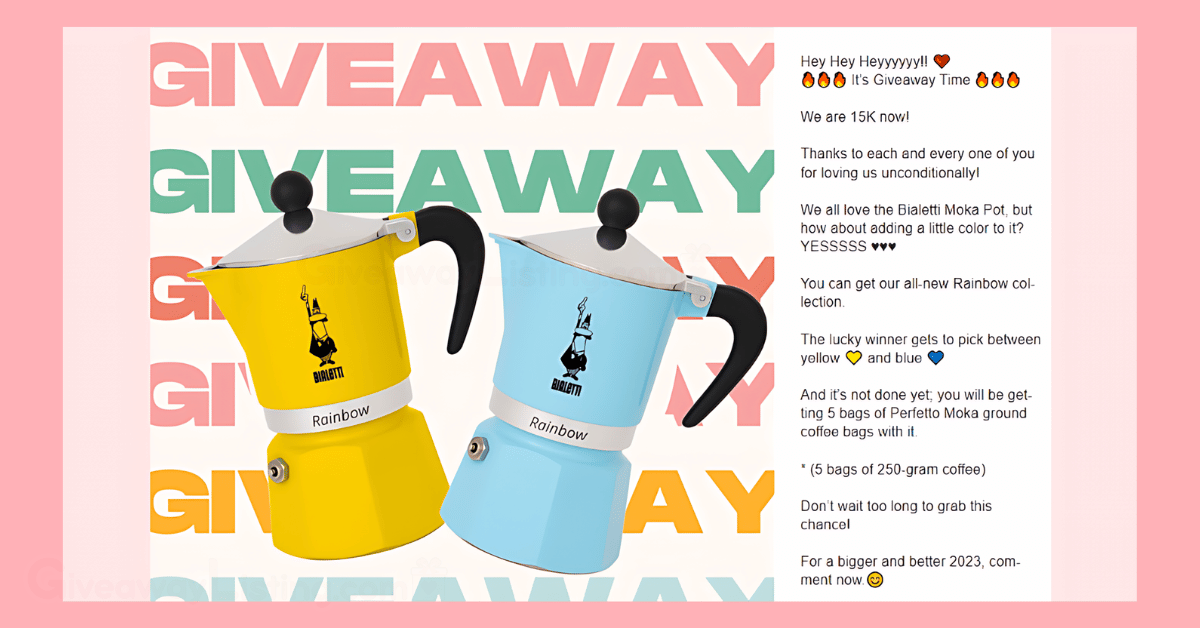
5. Specify a Deadline
Outline the duration of your giveaway from beginning to end. The promotion duration is an essential component of your contest terms and conditions.
This step ensures your participants won’t be unnecessarily disappointed if your giveaway were to end early or not start on time!
You also need to know when the contest ends so you know when to stop allowing entries. This portion of your giveaway rules ensures you hold a contest within most law guidelines.
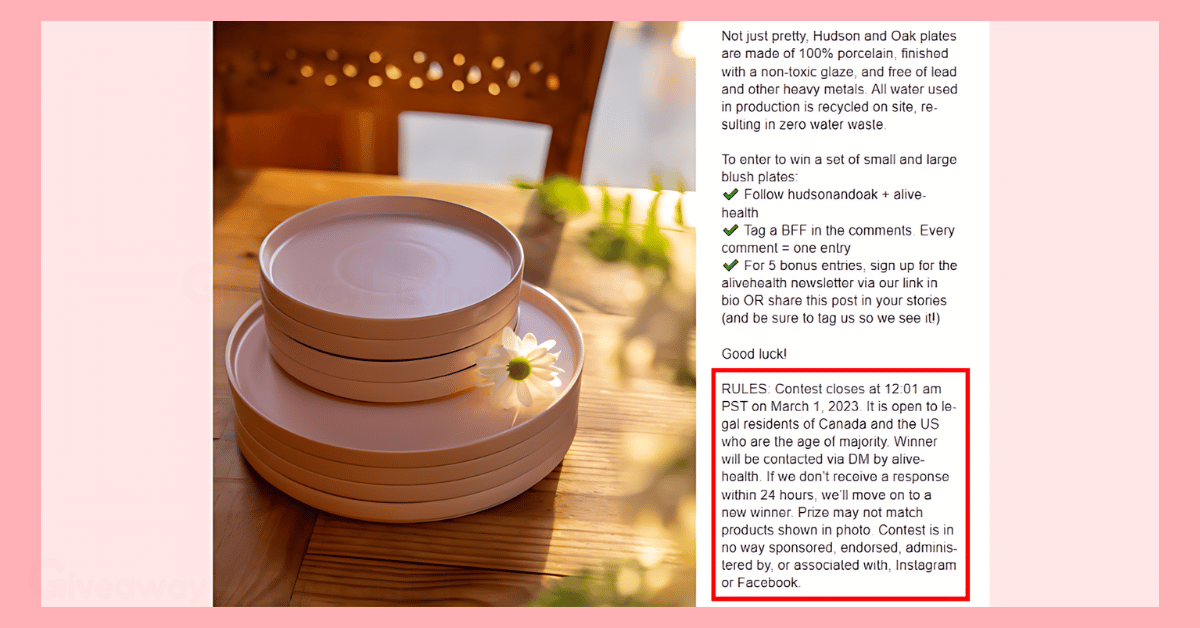
6. Make it Free
This component of a contest is pretty universal. Wherever the giveaway is held, it’s usually against local laws to monetize your giveaway unless you have a license (with some exceptions).
Across the world, you should never force anyone to purchase an entry for your giveaway. Making your giveaway completely free is especially necessary if you randomly select your winners, as this is considered a lottery, and you require a permit to run lotteries.
7. Keep Data Secure
This rule applies to everyone. Regardless of where you are in the world, you agree to keep your participant’s personal information secure.
If you are running a social media giveaway, you must trust that the social media platform keeps your participants’ information safe.
Still, you must inform your participants that their data is safe with you. Ensure you read the guidelines for social media platforms you use for a giveaway, and use our tips in this guide.
8. Specify Eligibility Requirements
You need to clearly state who is excluded from participating in your giveaway due to restrictions on age, country, or any other rule you set.
Identify any entry restrictions, and don’t include certain groups of people in your official rules and guidelines if they cannot enter the giveaway.
It’s common to restrict entries to people under 18 and certain regions with strict giveaway laws, such as Northern Ireland.
9. Prepare Winner Announcement Rules
Ensure you decide how your winner will be established and announced in your giveaway terms and conditions! For example, you might need to select your winner randomly or use a computer program (such as a third-party app).
If you’re running a contest like a competition, you must inform your participants how you will judge their entries.
All of these general giveaway rules will ensure you run a practical giveaway. With any luck, you will run a viral contest in no time.
Bonus tip: Check out the Giveaway Listing for more helpful tips to support the success of your contests! We have also included more helpful guides we’ll love throughout this one.
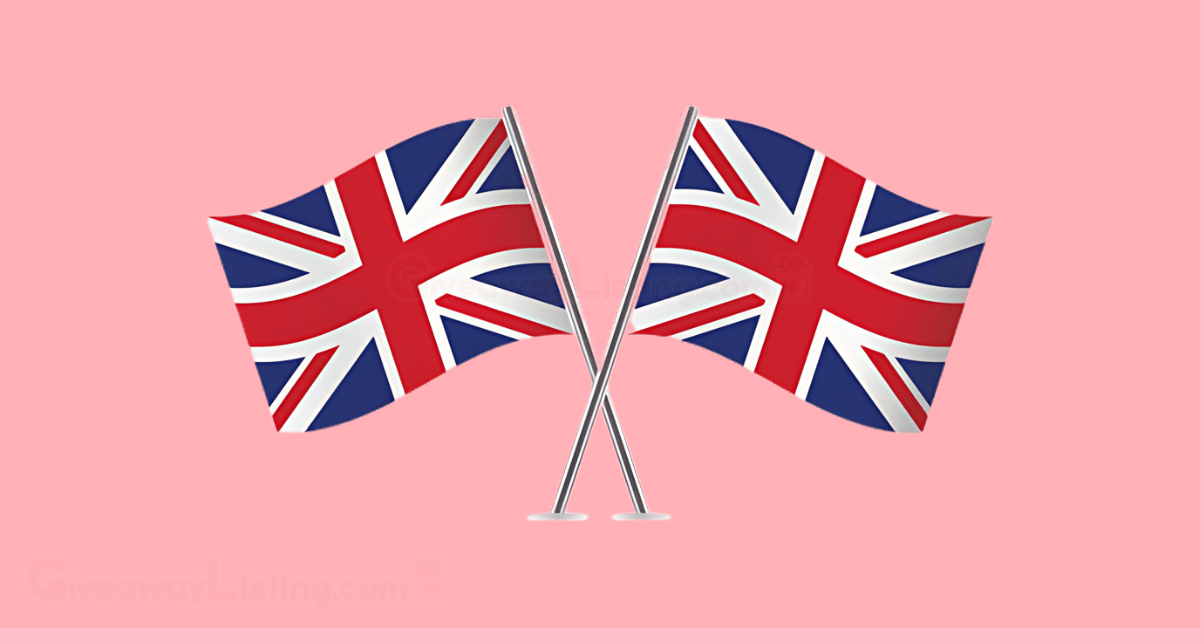
What are the Giveaway Rules in the UK?
If you want to run a giveaway within the UK, here are some contest rules to be aware of.
How to Avoid the Licensing Requirement?
The UK’s 2026 licensing requirement relates to gambling and paid giveaways.
There are steps to follow to ensure your giveaway isn’t subject to the UK licensing requirement. To do that, you can structure your giveaway in these two ways.
1. Make it a competition: If your giveaway participants must show skills or knowledge to enter, the giveaway may not be considered gambling. Therefore, no license will be required.
However, that’s if your giveaway rules can pass the court of law’s “skills test.” To ensure they can, you must structure the giveaway so most people can enter or win.
2. Make entry free: Paid entries require a license, and free giveaways require no permit.
Lotteries, Raffles, and Paid-to-enter Giveaways in the UK
The Gambling Act in the UK enforces a law that states certain types of promotions, such as lotteries, must be licensed.
If you are hosting an informal lottery in your place of work, that’s an exception to the rule. However, if you are holding a formal or public giveaway, you can be criminally prosecuted if you don’t have a license.
This law is only related to England, Scotland, and Wales in the UK because these countries are all overseen by the same Gambling Commission. Northern Ireland has its own governing body.
The laws differ across the UK but will be the same in Great Britain. Northern Ireland differs when it comes to gambling and paid giveaways.
So, if you cannot meet both regions’ regulations, you can exclude people in Northern Ireland from qualifying to win a prize. You can limit your entries to residents of Great Britain to ensure you are acting following one set of rules.

UK Brand: A Case Study
The UK fashion brand Pretty Little Thing recently held an Instagram giveaway and was put under the spotlight in ways it did not want. It was said to have breached a few rules.
Here’s what went wrong.
To win the prize bundle, the Instagram giveaway post specified that the participants must:
- Like and save the post
- Tag your best Galentines
- Comment a heart emoji on ANY post
- Share the post on your story for a bonus entry
- Enter as many times as you want
- Must follow @prettylittlething to enter
The participants had until 11:59 pm GMT on February 14th to enter.
So, what was wrong with their giveaway rules? There were quite a few things wrong with them.
The brand was criticized because there were too many giveaway rules. The brand was questioned about how they tracked which entrants had fulfilled the entry criteria. They were under fire for not administering the giveaway fairly.
To resolve this problem, the brand objected because it used a third-party app to host its giveaway. They argued that the third-party app produced the required data results, such as likes and comments.
The computer program also checks the winner’s eligibility by manually checking all entry requirements before randomly selecting a winner.
Pretty Little Thing was said to have breached the following rules of the ASA Committees of Advertising Practice Code, particularly:
- Rule 8.2: To avoid causing unnecessary disappointment.
- Rule 8.24: If winners are selected randomly by a third-party app, by an independent person, or under the supervision of an independent person, prizes must be given by the laws of chance.
It was agreed that the brand could not verify if the participant had commented a heart emoji on the post and saved it. Therefore, the chosen winner may not have satisfied all entry criteria. That would cause unnecessary disappointment if the prize were re-drawn.
The bonus entry was also a cause for concern as it didn’t increase the participant’s winning chances.
How to Avoid Similar Pitfalls
To avoid pitfalls like the above, ensuring that your giveaway entry criteria satisfy the Code’s rules is crucial.
In summary, some of the UK’s advertising rules are:
- Keep the giveaway entry requirements straightforward.
- Design your prize draws in accordance with each social media’s rules.
- Establish what apps can be used to check that entry criteria have been satisfied.
- Check what data you can extract from a social media platform and how you can use that to verify a winner.
- Write key information on your giveaway post, such as entry criteria, the prize, and start and end dates.
- Don’t forget to write the contest terms and conditions in the post description. These terms and conditions should include the Code’s requirements.

What are the Giveaway Rules in the US?
To keep everything above the board and prevent legal issues in the United States, you need a basic understanding of the country’s laws, potentially even more specifically in your state.
Types of Giveaways in the US
It’s important to use the correct name of the giveaway type you hold in the US to avoid a misnomer resulting in legal issues.
There are three main types of giveaways. It doesn’t matter which one you decide to use, but you need to state which one you use clearly.
- Contests
- Sweepstakes
- Raffles
If you need a refresher on the giveaway types, see our synopsis at the start of this guide.
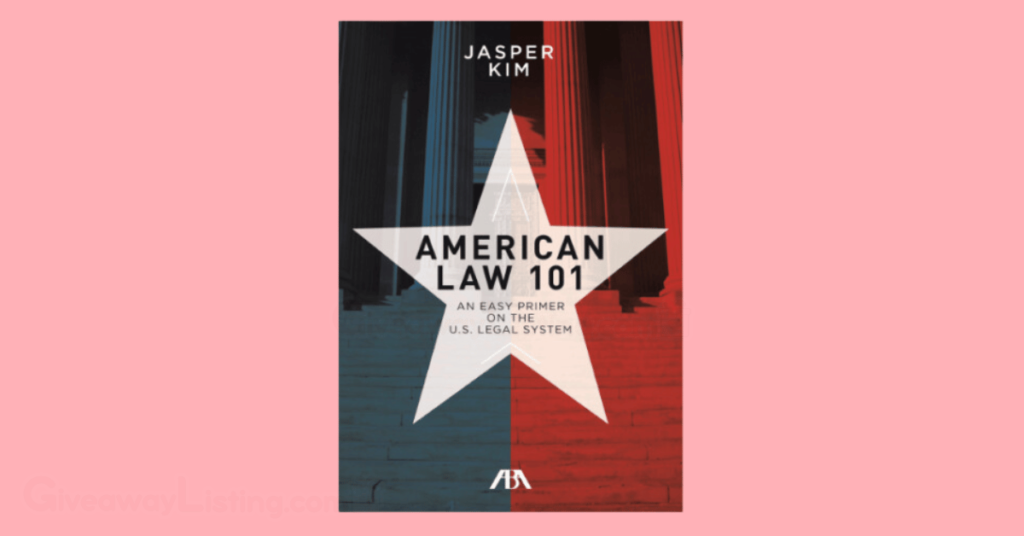
General Giveaway Laws in the US
When running a giveaway in the United States, you are prohibited by lottery and gambling laws from promoting any giveaway with all three elements: prize, chance, and consideration.
At least one of the three elements would have to be eliminated for the giveaway to be legal.
Of utmost importance:
- Sweepstakes must not be monetized or require participants to pay an entry fee.
- Anti-gambling laws apply to any giveaway in the US, especially online ones.
- Any type of giveaway must be transparent and state the date the winner will be selected, the winning odds, and the main details.
Key Promotional Terms in the US
If you promote a giveaway in the US, it’s essential to get your terminology right.
Many people interchange key promotional terms to their detriment. One incorrect word could result in legal action if you cannot defend your use of the term.
Familiarise yourself with the details of these key terms to avoid getting into trouble.
- Sponsor
- Entry
- Prize descriptions
- Winner
- Social platforms
- Tax Awareness
Your official giveaway rules should clearly identify the promotion sponsors (if you have any) and include their physical addresses. Ensure your giveaway’s official rules and details clearly outline who is eligible to enter and how they can enter. Clearly state if there is a limit on the number of entries allowed.
Note: By law, sweepstakes in the US must include an alternate method of entry (AMOE). You must provide alternative ways to enter the giveaway, giving everyone an equal chance. Some alternative entry methods include phone calls, text, email, social media, in-person, and online forms.
Always be descriptive about the giveaway prize. If the prize is instant cash, you need to outline how the cash will be issued. Will it be electronically awarded or paid via cheque, etc.? If the prize is an experience, what else is included? Where is it based, and how long will it last? Make sure to include all details of the prize.
Ensure the official rules clearly state how to win and how the winner will be selected. Using third-party apps is a great way to pick winners and avoid accusations of unfairness.
Describe the selection process. If you are holding a contest, judges will choose the winner. You need to specify how many winners will be selected and their odds of winning.
In addition to meeting giveaway laws in the US, following any social media rules is essential if you plan to host a social media giveaway. Check out our handy guide if you’d like to host one, as each social media platform has its rules.
Any promotional giveaway with a prize valued at $600 or more has tax implications. You must inform the winner of any tax laws. A prize worth $600 or more must be reported to the Internal Revenue Service. The winner must complete a prize validation provided by you stating they understand the tax responsibility.
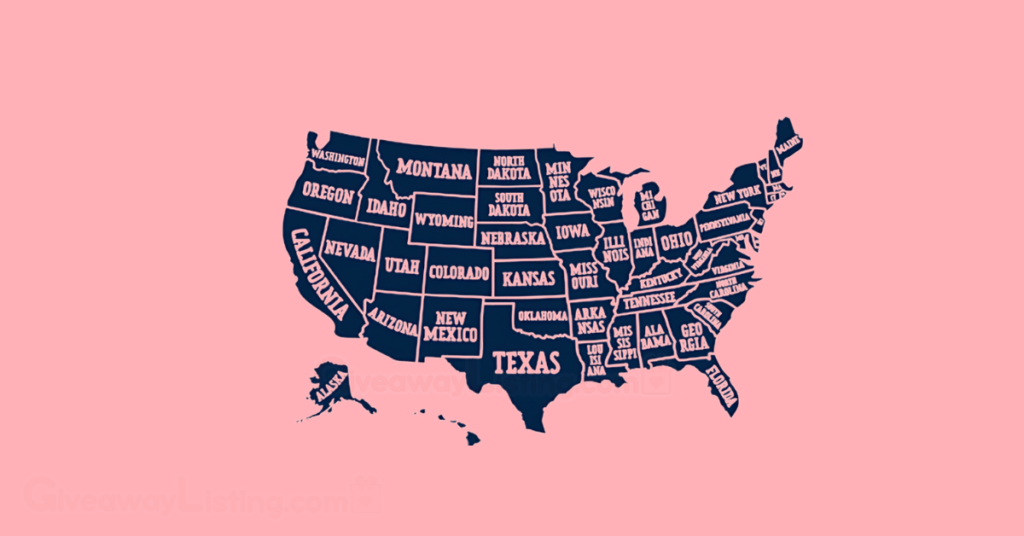
US State-Specific Giveaway Laws
Most states in the US follow general laws, but a few have slight differences. Some states have additional restrictions. The following additional laws will apply if you or any giveaway entrants reside in these states.
- Alabama: Sweepstakes that involve alcohol must be pre-approved by Alabama’s alcohol control board.
- Arizona: Beyond general US promotion laws, Arizona has three additional rules. First, you must not increase your product prices during the contest period. Second, you must register your skill-based contests that require participants to purchase a product with the state’s general attorney. You must also send a list of winners’ names to the state within 10 days of awarding the prize/s.
- California: No sweepstakes or contest can ask for the purchase of products, including entry fees. Any sweepstakes or contest involving alcohol must be open to all residents and not require them to visit certain premises. After that, general laws apply.
- Colorado: Again, no sweepstakes or contest can ask for the purchase of products, including entry fees. For mail-in events, entrants must receive detailed disclosures, for example, that the purchase is unnecessary and will not increase their winning chances. General promotion laws apply after that.
- Connecticut: Submission fees are allowed for skill-based contests, but limitations exist. You must ask the gaming department if your giveaway can request a payment. General laws apply after that.
- Florida: Seven days before a sweepstakes’ opening date, prizes worth $5K or more must be bonded and registered. Winners’ names must be provided to anyone who requests it. Standard laws apply after that.
- Indiana: Any alcohol sweepstakes must be pre-approved by Indiana’s alcohol control board. General laws apply after that.
- Maine: Any contests and sweepstakes open to minors may not collect personal data without consent from a legal guardian. General laws apply after that.
- Maryland: No skill-based contest can ask for the purchase of any kind, including entry fees. Standard laws apply after that.
- Massachusetts: No contests and sweepstakes may include tobacco-related prizes or activities. Standard laws apply after that.
- Michigan: Sweepstakes must not require entrants to visit a physical location like a store, as in-store entries constitute “consideration.” No contest or sweepstakes may include prizes associated with tobacco. General promotion laws apply after that.
- Nebraska: No sweepstakes or contest can ask for the purchase of products, including entry or submission fees. General laws apply after that.
- New Jersey: Again, no sweepstakes or contest can ask for the purchase of products, including entry or submission fees. General laws apply after that.
- New York: Seven days before a sweepstakes’ opening date, prizes worth $5K or more must be bonded and registered. Winners’ names must be provided to anyone who requests it, and names should be registered with the state. Standard laws apply after that.
- North Dakota: Once again, no sweepstakes or contest can ask for the purchase of products, including entry or submission fees. General laws apply after that.
- Ohio: Sweepstakes must not require entrants to visit a physical location, such as a store, as in-store entries constitute “consideration.” General promotion laws apply after that.
- Rhode Island: Retail businesses running sweepstakes with prizes totaling more than $500 must register their giveaway with the state. General laws apply after that.
- Tennessee: Sweepstakes winners must not be asked to accept publicity releases in perpetuity. Standard promotion laws apply after that.
- Vermont: No contest or sweepstakes may require a purchase, including entry fees. Anyone who requests sweepstakes winners’ names must not be required to pay postage fees. Any alcohol sweepstakes must be pre-approved by Vermont’s alcohol control board. General promotion laws apply after that.
- Virginia: Sweepstakes must not require entrants to visit a physical location like a store, as in-store entries constitute “consideration.” No contest or sweepstakes may include prizes associated with tobacco. General promotion laws apply after that.
What are Giveaway Rules in the EU?
The EU’s General Data Protection Regulation (GDPR) governs how an individual’s data can be processed and handled. To protect their data, all businesses must agree to follow specific requirements, including disclosure of what is collected and how it will be used.
The GDPR has seven requirements for the lawful running of contests. You need to meet each of the following:
- 1. Purpose limitation
- 2. Lawfulness, fairness, and transparency
- 3. Accuracy
- 4. Data minimization
- 5. Integrity and confidentiality
- 6. Storage limitation
- 7. Accountability
The data you collect from giveaway participants must be used for “specified, explicit, and legitimate purposes.” You cannot use the personal data you collect in other ways.
You must get an individual’s consent to collect their data. You must state why you are collecting it and use it as you stated. You must be honest and clearly state how the data will be used and how it will be safeguarded.
You must agree to collect and store accurate data. Any inaccurate data must be deleted.
You can only request to collect the information you need for your giveaway purposes. This information should be the least amount necessary. This amount may be one or two criteria only. You should not collect any further information unless it is for specific and legitimate purposes.
You must agree to keep the collected data secure from threats and protect it from unauthorized handling, loss, and damage. You must have security measures in place to protect the data.
You must reason how long you will store the information you collected for your giveaway. After that time, the data should be anonymized and destroyed.
You must keep compliance records that authorities can access at all times. By maintaining records, you must be accountable and ready to face an unscheduled audit.
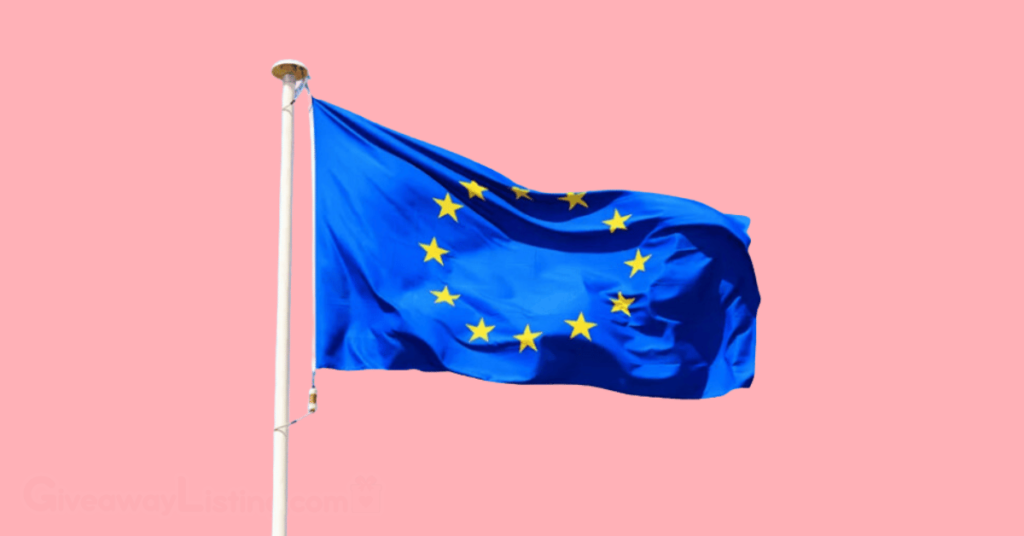
Other Eligibility Considerations in the EU
You must open your contest to all people, with a few eligibility exceptions and exclusions, including any of the following (when applicable):
- Those restricted by law
- People under 18 years of age
- Employees of your business, a sponsor or affiliate, or any immediate family members
You are usually allowed to reject a prize winner if they fall into these categories:
- If they fall in the contest exclusion criteria above
- They misrepresented their personal information.
- They were involved in the preparation of the contest
EU-Specific Giveaway Contest Laws
Here is a list of EU countries and specific giveaway laws that aren’t the standard laws that apply to all.
- The Netherlands: The giveaway prize must not exceed €100K annually. Each business has an annual maximum of one game of chance, with 20 drawings per game of chance maximum.
- Poland: All games of chance and giveaways are strictly regulated. Permits and bank guarantees are required, and the giveaway must occur in the country.
- France: No rules have to be filed with a judicial officer anymore, but you may need to record your giveaway with the data protection agency (CNIL).
- Germany: The Criminal Code, the German Act Against Unfair Competition, and the Interstate Treaty on Gambling govern giveaways. You must only collect data used for the contest.
- Italy: You must include a disclaimer stating that the giveaway is not associated with a social media network. The law also requires that collected data be hosted on an Italian server (which is impossible on social media).
- Spain: The winner selection process for random drawings must be conducted in the country. Sponsors must pay 10% of the value of the prize (which is gambling tax). Terms of the giveaway must be available to participants before entry and in Spanish.

What are the Rules for Holding a Social Media Contest?
If you run a social media promotion or giveaway, you need to know the specific rules of each platform. Social media rules are predominantly in effect worldwide.
Instagram requires you to include all official rules for the giveaway in your post. They discourage using likes for entries and tagging content or other people to enter the giveaway. There’s a release form that each person who enters the giveaway must complete.
To find out more about Instagram giveaways, see our complete guide to Instagram giveaways.
You must also include all official rules and requirements of your giveaway when promoting on Facebook. In addition, you are required to add a statement that states Facebook is not affiliated with or sponsoring your giveaway. You cannot ask for likes as sweepstake entries.
See our Facebook giveaway guide to learn more about incredible giveaways on Facebook and its rules.
Twitter has fewer giveaway restrictions than Facebook and Instagram. However, you cannot ask entrants to duplicate tweets or ask them to create multiple accounts to increase their winning chances.
To learn more about Twitter giveaway rules, check out our ultimate guide to Twitter giveaways!
Giveaway Terms and Conditions: Final Thoughts
When running your giveaway, you can keep it fun and legal wherever you’re based. As we’ve learned in this guide, a handful of rules apply worldwide.
Still, you should note specific terms and conditions applicable to the country where you run your promotion.
If you need more help with giveaways, our website has plenty of guides! Each guide contains handy tips. Check out our giveaway tips to start.
Check back with Giveaway Listing for the latest giveaway guides, and browse our live feeds to get inspiration for your next viral contest.
Running a small giveaway within your country can work to your advantage. It can also go viral and earn new leads for your business.

Giveaway Terms and Conditions FAQs
Here are answers to some frequently asked questions about Giveaway Terms and Conditions.
What Countries Allow Giveaways?
Most countries generally allow giveaways, but some have stringent laws that make it nearly impossible to run a practical giveaway.
What Countries Prohibit Giveaways?
Some countries have many restrictions, making it tricky to include them in worldwide sweepstakes.
For example, some have strict registration and bonding requirements and licensing laws, especially Quebec (Canada), Austria, Brazil, the Czech Republic, Hong Kong, and the Philippines. Australia has different requirements depending on the state.
Other countries such as Italy and Spain are impractical as they require the winners to be local citizens, making it impossible to hold bigger giveaways (that are legal).

